 Image search results - "yokaichi" Image search results - "yokaichi" |
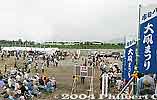
I saw the Yokaichi Giant Kite Festival (Odako Matsuri) for the first time on May 23, 2004. The site is alongside the Echigawa River near the Yachiyo Bridge. A free shuttle bus from Yokaichi Station is provided, taking about 10 min.
|
|

Crowds
|
|

Mini kite contest. Kite contestants show off their kite designs at their tents.
|
|

The Big One. The size is equivalent to 100 tatami mats or about 12 meters x 13 meters (156 square meters).
|
|

May 27, 2007 was a bad day for giant kite flying in Yokaichi, as the giant kite crashes head-first into a bamboo grove on its first and last flight during the Yokaichi Giant Kite Festival.
|
|

At slightly past noon with medium-force winds, the giant kite is launched. The kite immediately went straight up. The giant kite is 13 meters high and 12 meters wide, and weighs 700 kg.
|
|

It flew very high, up to about 150 meters, then veered to the right, over our heads.
|
|

Then it suddenly dove straight down and crashed head-first into the bamboo grove. Ironically, the blue banner on the left says, "Ganbatte" (Do your best).
|
|

The giant kite was swallowed whole by the bamboo trees. No one was hurt. Also see my YouTube video here. 大凧が竹やぶに落下
|
|

All we could see were the kite strings.
|
|

The sign says "Arigato gozaimasu" (Thank you). I guess the bamboo was hungry for a giant kite.
|
|

This was the 2nd time in three years for the giant kite to meet a major accident. In 2005, the kite broke in half in the sky and crashed into a crowd of people below.
|
|

"So how does it look?" "It looks pretty bad, boss."
|
|

Members of the giant kite preservation society look on as the disappointing and heartbreaking situation is assessed.
|
|

Carved paper
|
|

Hanging on to the strings...
|
|

As I expected, they soon started cutting down the bamboo.
|
|

A small clearing was made around the kite.
|
|

No way would this guy be able to pull the kite out of this one...
|
|

How he wished that he could just pull the strings to drag the kite out.
|
|

The kite strings were too tangled in the bamboo.
|
|

A closer look at the accident scene. The kite suffered significant damage, and it took about 20 days to repair.
|
|

As I predicted again, they started disassembling the kite so they could roll (crumple) it up and carry it out. The kite was not flown again for this festival. It was to be its final flight since it will be replaced next year.
|
|

Carrying out bamboo. Many people left the festival after the kite crash.
|
|

Stack of cut bamboo.
|
|

People's fortune stickers on the kite. 願い札
|
|

Medium-size kites entered in a kite-flying contest.
|
|
|
|
|
|
|
|
|
|
|

Stringing the kite
|
|

Ready for flight
|
|

Kite corner
|
|
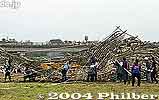
Launch pad. The kite is carried to the take off point and pointed toward the wind, which unfortunately very weak this day.
|
|

Raising the kite. Long bamboo poles are used to prop the huge kite upward to meet the wind.
|
|

Take off. On cue, the people pulling the kite start running and the kite starts to lift off. Also see the video at YouTube.
|
|

Snapped part being repaired.
|
|
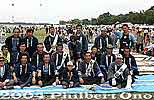
Yokaichi Giant Kite Preservation Society. This is the group responsible for producing, maintaining, and flying the giant kite. 大凧保存会
|
|

Sagamihara kite team invited. Sagamihara city in Kanagawa Prefecture also has a giant kite festival, and they were invited to fly a smaller version of their kite at Yokaichi. (Yokaichi was also invited to Sagamihara's kite festival in April.)
|
|

Sagamihara kite in flight. Due to a lack of wind, this flight didn't last long.
|
|

Banzai from Sagamihara. After the kite's flight, the Sagamihara team give a few banzais to themselves and to Yokaichi.
|
|
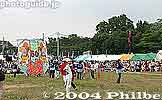
Mini kite flying contest. The flying portion of the kite contest is held.
|
|

Mini kite flying contest
|
|
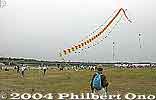
Kite train or "rendako." These kites are pretty to watch. 連凧
|
|

Giant Kite sake. The food and souvenir booths sold a variety of merchandise including this locally-brewed sake, complete with a label showing this year's kite design.
|
|

Kite pullers wanted. This booth, next to the giant kite, is where you can apply to pull the kite. Anybody can apply to pull the giant kite. I applied and got a little kite pin and a pair of gloves.
|
|

Ready for another flight
|
|
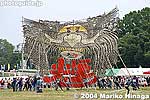
Yokaichi giant kite coming up.
|
|
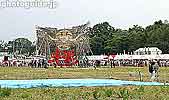
100 kite pullers
|
|
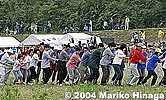
OK, RUN NOW!! This is the most exciting part when we start running with the rope. It was like a stampede, and I let go after a few seconds to avoid getting runned over by the mob behind me.
|
|

And lift off...
|
|

Yokaichi Odako giant kite Air borne
|
|

Higher and higher...It went up to about ?? meters.
|
|

No wind. This flight lasted only about 30 sec. We ran about 50 meters, then the kite fell back to Earth. Also see the video at YouTube.
|
|

Festival poster
|
|

The Yokaichi Giant Kite Museum exhibits the city's giant kite used previously, as well as many different kites from all over Japan and the world. About 20-min. walk from Ohmi Railways Yokaichi Station. Map
|
|
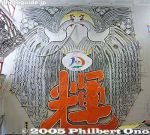
The giant kite is replaced every three years. The previous giant kite is displayed in the museum, while the current giant kite is flown on the last Sunday in May near Echigawa River.
|
|
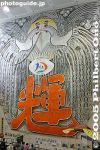
The giant kite measures about 13 high and 12 meters across, or the size of 100 tatami mats. This kite flew during 2002-2004. A new giant kite is made every three years.
|
|
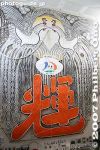
What makes the kite unique is that the kite paper is carved with numerous cutouts, based on the design. It is not a solid sheet of paper.
|
|
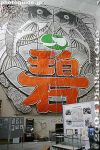
Giant kite displayed until 2004.
|
|
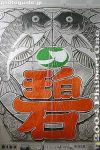
The design is also characterized by having a pair of creatures and a Japanese kanji character. Together, they indicate a clever meaning based on word play.
|
|

Hundreds of kites from all over Japan and the world
|
|
|
|
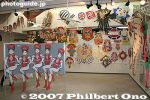
An incredible variety of kites are displayed. They come from all 47 prefectures of Japan and many foreign countries.
|
|

Wind Goddess kite.
|
|

Kite train, called rendako 連だこ, based on Awa Odori dancers in Tokushima Prefecture.
|
|
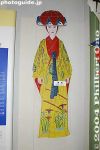
Okinawan dancer (yotsudake) kite
|
|
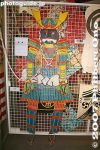
Samurai kite
|
|
|

Kite from the USA, obviously.
|
|
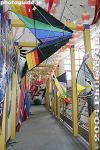
Kites from around the world.
|
|
|
|
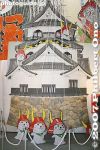
Hikone Castle kite, displayed in 2007, the 400th anniversary of the castle.
|
|

Mini theater
|
|
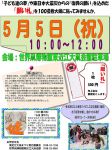
On May 5, 2013 (Children's Day), the kite museum held an event for children to write their wishes on paper stickers to be affixed on the back of the giant kite.
|
|
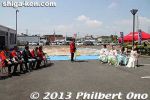
It started with a ceremony with the mayor of Higashi-Omi and the four "Wind Goddesses."
|
|
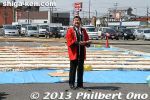
Mayor of Higashi-Omi
|
|
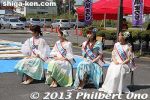
The Wind Goddesses are like festival princesses who pray for good wind to blow to fly the giant kite.
|
|
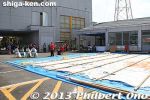
Behind the ceremony is the giant kite waiting for more wishing stickers.
|
|
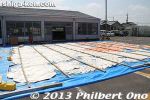
The Higashi-Omi giant kite.
|
|

Booth to buy wishing stickers for 500 yen each. Proceeds were donated for recovery efforts in Tohoku.
|
|
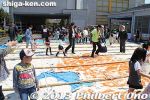
After writing their wishes, kids paste their wishing stickers on the kite.
|
|
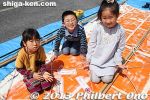
After writing their wishes, kids paste their wishing stickers on the kite.
|
|
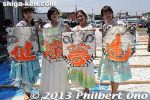
Wind Goddesses at Higashi-Omi Giant Kite Museum.
|
|

Kids could also make a small kite for 300 yen.
|
|
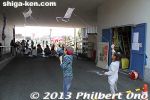
The little kites flew well.
|
|

My video of shot on May 5, 2013 of kids visiting the kite museum and pasting wishing stickers.
|
|

Ohmi Railways Yokaichi Station. A modern ferro-concrete building was completed in June 1998 to replace the old wooden building.
|
|

Ohmi Railways Yokaichi Station 近江鉄道八日市駅
|
|

Mural at Ohmi Railways Yokaichi Station
|
|

Chokotto bus ちょこっとバス
|
|
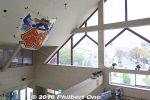
Yokaichi Station always has a large kite decoration.
|
|

Large kite in Yokaichi Station.
|
|

A kite hangs inside the airy pyramid roof of the station building.
|
|

View from station window. The area in front of the station is now lined with shops like Heiwado department store.
|
|
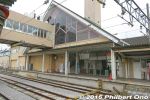
Overpass to station building.
|
|

Ohmi Railways train at Yokaichi Station.
|
|

Kite decoration on mailbox outside the station.
|
|
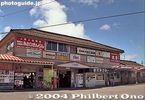
Old Yokaichi Station. My first picture of Yokaichi, before this old station was torn down in 1997. I had to change trains at Yokaichi Station on the Omi Railway Line and had time to step out and take this picture. 旧八日市駅It was a small station, but the wooden building looked quite charming. There was nothing in front of the station, just a large paved area. A far cry from what it looks like today. Power/telephone lines are also underground, making the streets look clean and attractive.
|
|
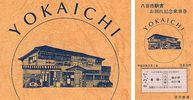
The Yokaichi Station building was replaced by a new building in 1998. March 1, 1997 was the last day when the old station building was used before it was torn down. Omi Railways issued this commemorative ticket to mark the occasion.The drawing of the station and my photograph look almost exactly the same. The same advertising and billboards are on the building. Even the vending machines on the left are pictured in both.
|
|
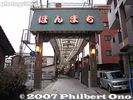
Honmachi Shopping Arcade, now almost devoid of people.
|
|

Honmachi Shopping Arcade's shuttered doors.
|
|

Best to see my Shotoku Matsuri Youtube video to hear the songs and see the dance.Held near Yokaichi Station in summer, the Yokaichi Shotoku Matsuri is a bon dance featuring Shiga's native Goshu Ondo folk song. 八日市聖徳まつり・江州音頭総おどり
|
|
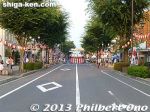
Held near Yokaichi Station in summer, the Yokaichi Shotoku Matsuri is a bon dance featuring Shiga's native Goshu Ondo folk song. 八日市聖徳まつり・江州音頭総おどり
|
|
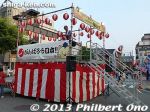
Yagura tower where the singers and musicians perform Goshu Ondo songs.
|
|

Local mascots like Gao appear on stage
|
|
|

Soon this street perpendicular to Yokaichi Station will be filled with dancers.
|
|

Entrance to Honmachi arcade.
|
|
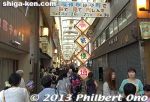
Honmachi Saturday Night Market is held on the same day as the Shotoku Matsuri. 本町土曜夜市
|
|

Lots of people inside Honmachi arcade. So many people that it got quite hot. There's no real ventilation.
|
|
|
|
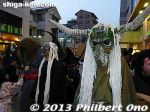
Yokaichi's connection with yokai comes from its place name "Yokaichi," a pun for "Land of Yokai." Although "Yokaichi" does not mean that.
|
|
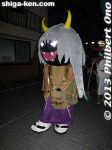
Yokai parade led by Gao.
|
|

The dance begins.
|
|
|
|
|
|
|
|
|
|
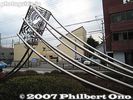
Kite sculpture
|
|
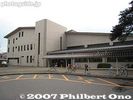
Yokaichi Library
|
|

Inside Yokaichi Library. Giant kite with the words for "Knowledge" is written.
|
|
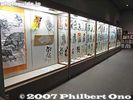
2nd floor gallery area.
|
|

Shin-Yokaichi Station on the Ohmi Railway, the stop before Yokaichi Station terminal.
|
|

Shin-Yokaichi Station on the Ohmi Railway, the stop before Yokaichi Station terminal.
|
|

Train going to Omi-Hachiman from Shin-Yokaichi Station.
|
|

Shin-Yokaichi Station is a Western-style, two-story wooden building built in 1913. The second floor is closed to the public due to old age. It originally housed the Konan Railway company’s head office (湖南鉄道).
|
|

Konan Railway originally operated the railway between Yokaichi and Omi-Hachiman before it merged with another company that later merged with Ohmi Railways.
|
|
|
|
|

Tourists don’t normally get off at this station since most attractions are at the next stop, Yokaichi Station.
|
|
|
|

Toilet
|
|

Turnstile
|
|

Inside Shin-Yokaichi Station.
|
|

Love the inside of Shin-Yokaichi Station.
|
|

Train ticket window is manned only in the mroning.
|
|
|

Waiting room inside Shin-Yokaichi Station.
|
|
|
|
|

I wonder how old these benches are. Older than my mom perhaps.
|
|
|

Ceiling light.
|
|
|
|
|
|
|
|
|

Wish we could go up to the 2nd floor.
|
|
|

Shin-Yokaichi Station looks brown from the sides, but it's green on the front.
|
|
|
|

Amazing that this station is still being used. I figure its days are numbered though.
|
|

Roof needs repair.
|
|

Looks like no one will repair this building.
|
|
|
|

Nature trying to reclaim its place.
|
|

Signs of age in many places, but it adds to the rustic charm.
|
|
|
|
|
|
|
|
|
|
|
|
|
|
|
|
|
|
|
|

Hirata Station on the Ohmi Railways.
|
|

Guest kite from Yokaichi, Shiga PrefectureThis is a smaller version of their giant kite. Yokaichi (Higashi Omi) also holds a giant kite festival in May.
|
|

Yokaichi's anchor truck
|
|
|
|